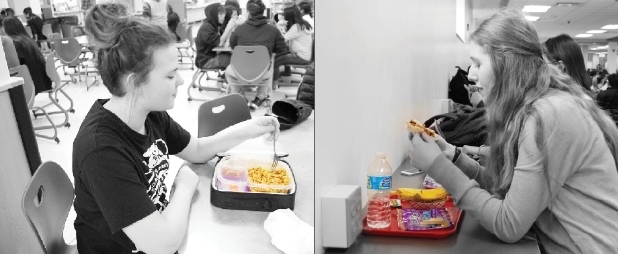Vegan vs vegetarian
(Left) Sophomore Olivia Barnett eats pasta with vegan cheese, carrots and almonds for lunch to satisfy her vegan lifestyle on Feb. 22. Barnett has been a vegan for only around a month but hopes to continue to be a vegan for the rest of her life. (Right) Although most days sophomore Samantha Beckham brings her vegetarian style lunch, she eats a peanut butter and jelly uncrustable sandwich, a banana and seasoned potatoes on Feb. 19. Beckham loved meat but still decided to be a vegetarian in 2010.
February 26, 2016
Walking into the lunch line at SHS, students have the options of nachos, a spicy chicken sandwich, Smart Mouth pizza and more. For sophomore Samantha Beckham, these options become slim, but for sophomore Olivia Barnett, these option are even slimmer.
Beckham and Barnett have chosen the lifestyle to eliminate meat from their diet. Barnett has taken it even further by avoiding all animal byproducts. Beckham, a vegetarian, doesn’t eat meat, while Barnett is a vegan and does not eat meat nor any products produced by animals, including milk, cheese and eggs. This is why they both regularly pack school lunches.
“Typically I bring my lunch,” said Beckham. “I feel like they don’t offer a lot of (vegetarian choices).”
Veganism and vegetarianism affect every aspect of one’s diet, including planning what food to eat and the nutrients each food is providing, according to Dr. Janet Bond Brill, a nutrition and fitness expert.
“It’s better for our health, better for the health of the planet and, of course, better for the animals,” said Brill.
Vegan
Olivia Barnett had been a vegetarian for four and a half years, but just recently made the switch to veganism. She says she has enjoyed foods such as cheese and pizza, which catered to her vegetarian diet up until now.
“It’s good. It’s not as bad as I thought it would be,” said Barnett. “I can have most of the meals I had before and just take out some of the things.”
Barnett says she had been wanting to become a vegan for over a year after learning how the animal product and byproduct industry is not different than the meat industry in the way they generally treat the animals. She also says both industries affect the environment tremendously, through water usage, over abundance of land clearance and greenhouse gas production.
She says the transition, although much different than what she was eating before, has been much easier due to her previous diets of mainly plant-based foods.
When making the switch, Brill says a common mistake of first-time vegans and vegetarians is not maintaining a sufficient diet, which can be avoided through planning one’s meals to ensure key nutrients are included in a vegan or vegetarian diet.
“A lot of vegans are short in the iron department, because they are not getting in that heme iron, which is the animal form of iron,” said Brill.
Before becoming a vegan, Barnett admits she had her doubts since she didn’t know how she would be able to supplement the proteins and other nutrients she’d be missing out on by not eating animal-based products. She also says she was worried if her new diet would affect others around her.
“My main fear was affecting other people with how my diet changed, but, I mean, it really hasn’t been that bad,” Barnett said.
She says her diet has not changed much, but she misses things she can no longer have like junk food. She admits that although her new vegan diet is much healthier than a non-plant-based diet, she still has treats such as vegan cookies, even if they are unprocessed.
Vegetarian
Samantha Beckham has been a vegetarian for almost six years, since 2010.
She says it’s difficult being a vegetarian since no one in her family and none of her friends made the switch with her. Although she loved eating meat in the past, she remains devoted to abstaining from meat.
“It is difficult at times, but I care more about vegetarianism,” Beckham said.
Like Barnett, Beckham wanted to abstain from meat due to her knowledge of the treatment of animals in the meat industry, feeling that the process is inhumane.
Beckham says that although vegans have a point when pointing out the flaws of the egg, milk and animal byproduct industry, she feels as if it is more humane than the meat industry. She says not all animal byproduct producers harm the animals, justifying why she remains just a vegetarian.
“It’s certain places,” said Beckham. “You have to make sure that it’s coming from a good place.”


